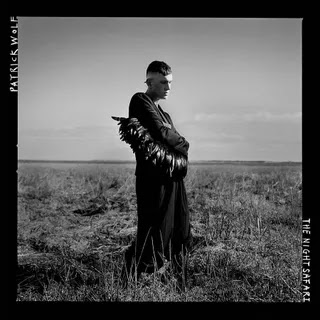Katie Stelmanis’ fourth album swings for big, embodied pop moments without shying from the strangeness and discordance that’s animated the project since the beginning.
Katie Stelmanis has a voice like a beacon, a sound that can shear through any accompaniment, no matter how drab. She shares this power with ANOHNI and Zola Jesus, singers who enchant their surroundings with the depth and richness of their timbres, who are instantly recognizable in any setting. Her voice comprises the central pillar of her synthpop project Austra, the feature around which her music crystallizes. The Canadian artist’s previous album, 2017’s Future Politics, shifted deeper into the icy trappings of club music, laminating Stelmanis’ voice inside the production styles of deep house and trance. On HiRUDiN, Austra’s fourth LP, the project breaks from that rut, swinging for big, embodied pop moments that let the warmth of Stelmanis’ voice shine through.
The most dynamic of Austra’s albums, HiRUDiN cultivates the raw pleasure of pop hooks without shying from the strangeness and discordance that has lit up the project since its 2011 debut. Live drums bolster songs like “How Did You Know?” and “Messiah” to the heights of Celine Dion’s late ’90s radio hits, a level of urgency that Stelmanis’ voice is readily equipped to handle. But even as she navigates sweeping and sugary choruses, dissonant figures prickle in the background—a stray looping whistle, the glassy shards of a synth arpeggio, the reverb on a piano chord bleeding into abrasive feedback. These bitter notes bring the sweetness of the vocal melodies into focus, making them all the easier to relish.
Stelmanis brought co-producers Rodaidh McDonald and Joseph Shabason into the mix for the first time on HiRUDiN, and worked alongside Cecile Believe—the singer and writer whose presence enlivened SOPHIE’s debut album in 2018—on two of the album’s most striking tracks, the advance singles “Anywayz” and “Mountain Baby.” The latter introduces a children’s choir to the world of Austra, a move that contrasts with Believe’s trip-hoppy guest vocals but whose uncanniness ultimately locks into place. (Who better to sing about the blank innocence of new love than literal children?) These additional players open up the album until it sounds enormous and full, busily populated without losing particulate detail. Mountains serve as a recurring lyrical image, and the scope of the production matches the landscape—HiRUDiN towers, engulfing the listener.
Plenty of pop music about the end of a relationship tends to project personal disaster outward: A couple breaks apart, and so does the whole world. Here, Austra takes a different tack. “Anywayz” dwarfs Stelmanis’ heartbreak, situating it within a planetary scale. “We’ll figure it out/But what if we don’t?/And the world keeps turning anyways,” she sings, her voice lifting into an upbeat hook. There is comfort—even euphoria, release—in the suggestion that her individual tragedy does not matter one bit to the world at large, that it falls away alongside so many other small sufferings as the earth keeps churning itself into the future. Flowers grow no matter how sad you are. For some, that’s an insult, a slight in the face of all-consuming, all-important sadness. For Stelmanis and her new cohorts, it’s a strange relief.
👉👇You May Also Like👇👌
View the original article here
















0 comments:
Post a Comment